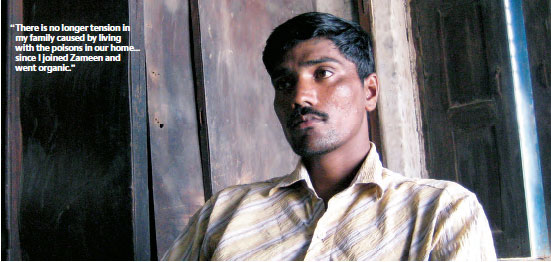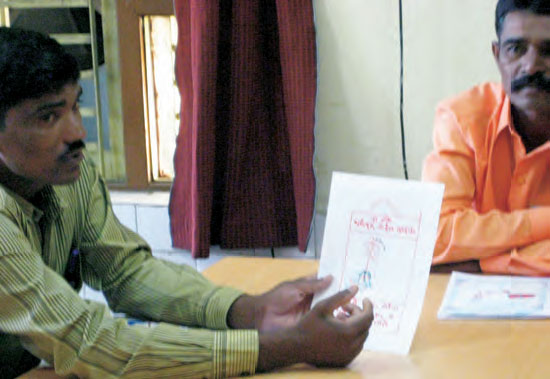Pesticide Free Health Impact | Sandip Kuthe

Profile: Sandip Kuthe
Sandip is 26 years old and has been farming in Amravati in the Vidarbha region of Maharashtra for three years. He lives with his mother, father and younger sister and has been a Zameen shareholder for two years.
Background
Cotton accounts for 16% of global insecticide use, far more than any other commodity despite occupying just 2.4% of the world’s agricultural land. The World Health Organisation estimates the cotton industry consumes $2 billion worth of chemical pesticides annually, just under half of which it classifies as hazardous.
India is home to one third of the world’s cotton farmers, their crops accounting for 54% of the country’s annual pesticide consumption despite growing on only 5% of its arable land. 60% of agrochemicals applied to cotton worldwide are insecticides, which are known to impair biological processes such as the nervous and reproductive systems.
The effects associated with insecticide and pesticide exposure in humans include weakness, cramps, tremors, nausea, paralysis, impaired neurological development in foetuses and infants, chronic fatigue syndrome, Parkinson’s disease, unconsciousness, convulsions and, in extreme cases, death.
Prolonged exposure to low doses can result in toxins accumulating in the body over time, causing impaired memory and concentration, disorientation, depression, irritability, confusion, headaches, speech difficulties, slower reaction times, drowsiness and insomnia. It is estimated that between one and five million cases of pesticide poisoning occur every year.
Many of the pesticides used by cotton farmers in the region have been banned in Europe and the US due to links to such health problems and cancer. The developing world uses approximately 30% of the world’s pesticides, but suffers 99% of the estimated 20,000 pesticide induced deaths worldwide each year.
Sandip’s Story
Sandip used chemical pesticides and fertilisers like all the other farmers in his village. He knew the chemicals were making him and his cattle ill, but he believed it was the only way to secure his harvest.
His health complaints ranged from rashes and constant itching to dizziness, eye ache and even vomiting. Unable to read the warning labels and unaware of the meaning of the health hazard symbol, he continued to spray his crop every day, not wearing any protective clothing or facemasks.
Whilst spraying his crop one afternoon the backpack strapped to his body split open, spilling undiluted pesticides over his bare skin. He was in searing pain and was left with a raw wound for weeks where the chemicals had burned away the skin on his back.
“I was ready to leave the village to find work in the city. Farming with pesticides was costing me my health and not putting enough food on the table. Now my inputs costs are lower, I am saving money through pesticide free farming. I am happy to stay with my family and am proud of the improvements I have brought to our community through Fairtrade.”
Sandip started to hear about some farmers in a neighbouring village who had formed an organic farmer group through Zameen. They were learning new farming techniques in order to control pests without using harmful chemicals. Sandip had never heard of organic farming before then, but he knew he wanted to learn more.
“Living with the pesticides caused us all a constant headache with worry. There is no longer tension in my family caused by living with the poisons in our home. Now we have fun mixing the ‘five cow’ natural fertiliser and making the neem plant-based pest control together as a family.”
Through Zameen, Sandip has been trained to make and use organic pesticides and fertilizers, and no longer has to use any sort of hazardous agro chemical. He has gone on to diversify into food crops as an extra source of income and to help the natural soil fertility of his fields through crop rotation.
Sandip attending a Zameen branding workshop in Nagpur. He and the farmers in his group plan to package and sell their organic dahl onto India’s growing organic market.

